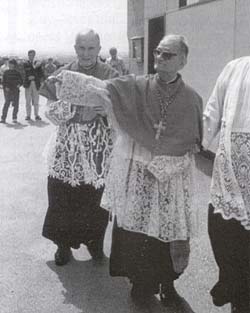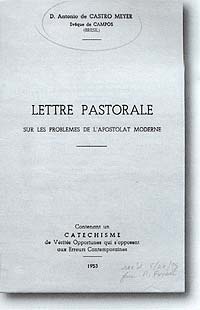Pastoral Letter: On The Problems Of The Modern Apostolate
Bishop Antonio de Castro Mayer

Bishop Antonio de Castro Mayer blesses the seminary at Ecône
before the Episcopal Consecrations (June 30, 1988).
Behind him, Archbishop Lefebvre assists.

For the first time in English, The Angelus will serialize On the Problems of the Modern Apostolate, the monumental pastoral letter of January 6, 1953, written by Bishop Antonio de Castro Mayer which identified modernist creep, crystallized the Church's teaching for his diocese (Campos, Brazil), and thereby saved clergy and faithful from the seduction of Vatican II.
Continuing what was begun in the December 2002 issue, we advance four more of Bishop de Castro Mayer's eighty True/False propositions which are classed into seven sections in the original letter: I. The Liturgy (1-13), II. The Structure of the Church (14-31); III. The Methods of the Apostolate (32-40); IV. The Spiritual Life (41-49); V. The New Morality (50-60); VI. Rationalism, Evolutionism, Laicism (61-65); VII. Relations Between Church and State (66-80).
Catechism of Opportune TRUTHS
Opposed to Contemporary ERRORS
|
11 TRUE No spirituality immunizes man against the danger of proximate and voluntary occasions of sin, which he must avoid. Exercising the apostolate at the proximate risk of one's salvation is presumptuous, and one cannot count on the Lord's blessing. |
FALSE To prohibit the faithful from frequenting balls, dances, and swimming pools is backward moralizing. Nourished by liturgical piety, they can frequent these places without danger and practice the apostolate of example by manifesting Christ by their own presence. |
|
Explanation: The erroneous proposition would be true if there existed a (sacramental, vital) union with God obtained by means of the liturgy, a union not only superior to, but even unrelated to, moral union. Or it would be true if, according to another hypothesis, the life of grace were such that it dispensed with man's co-operation. But for whomever professes the authentic Catholic teaching, none of these suppositions can be accepted. Today as always, the Holy See and the moralists warn the faithful against amusements that constitute proximate occasions of sin. The refuted sentence calls to mind the quietism condemned by Innocent XI on 26 August and 27 November 1667. Among the condemned propositions is this one: "If one scandalizes others by one's own defects, it is not necessary to reflect, as long as the will to scandalize is not present, and not to be able to reflect upon one's own defects is a grace of God" (Denzinger 1230). The refuted sentence supposes an automatic sanctification without any co-operation of the human will. |
|
|
12 TRUE A state of life's degree of perfection is measured by the union to God which it fosters, and union to God results from sanctifying grace and charity. That is why it supposes a greater abnegation on the part of the one who embraces it, and it must furnish him with greater means of sanctification. That is why the state of perfection par excellence is the religious state, and the state of perfect chastity is higher than that of marriage. |
FALSE The married state is to be exalted above the state of perfect chastity because it is sanctified by a sacrament. |
|
Explanation: It cannot be affirmed that every state constituted by a sacrament is for that reason more perfect than another. Thus, while there is no special sacrament for the religious state, we know that our Lord presented the practice of the evangelical counsels as the summit of perfection. Regarding the superiority of virginity to matrimonial continence, one can read on this subject I Corinthians 7, and in the Summa Theologica, II-II, Q. 152, Art. 4 as well as II-II, Q. 40, Art. 2 ad 4. Moreover, virginity can be considered as the fruit of the sacrament of the Eucharist, which makes it possible for mortals. The refuted sentence has been censured several times by the Church, as in, for instance, the Syllabus of Pius IX (Dz. 1174), and in Pius XII's allocution to religious sisters in Sept. 1952, in which the Holy Father blames priests, laymen, preachers, orators, and writers who "have no word of approbation or praise for virginity consecrated to Jesus Christ, and who, for years now, despite the Church's warnings and contrary to her teaching, accord to marriage in principle a preference over virginity, and who even go so far as to present marriage as the only means capable of securing to the human personality its natural development and perfection." He expresses the same thoughts in his allocution of April 23, 1952, to a group of young ladies in which he repeats that the religious vocation will always be a more perfect state than that of matrimony. There is no need to expound upon the immense harm that these ideas are causing in our diocese, in which the Protestant propaganda against celibacy is one of the arms with which the heretics sate their hatred of anything that comes from the true Church of God. |
|
|
13 TRUE The parish is the fundamental unit of the diocese, and as such, it is necessary for all the parishioners to keep in touch with the pastor and be under his direction. Such contact and such direction are entirely compatible with the fact that the faithful receive the sacraments and attend holy Mass in other churches. That is why these practices must be neither forbidden nor discouraged. |
FALSE Since the parish is a community, all the parishioners must participate together in the same sacrifice, receive graces from the same spiritual father, and unite their prayers in the same church. For the faithful to frequent other parishes or non-parish churches breaks the unity of community life. |
|
Explanation: If by community life one means the participation of the faithful in the same supernatural mysteries, it loses nothing of its intensity by the fact that the parishioners participate in these mysteries in different churches. If by community life one means an edifying natural life in common, such a life is also possible for the faithful in another church than the parish church. The fact of someone frequenting a monastery church, for example, while living in common with edifying laymen of his parish or other parishes, can only be very beneficial to him, and the spiritual advantages he receives necessarily have a good influence on his own parish. The action of religious and rectors of non-parish churches who instruct the faithful on their duties to the parish and the pastor, and who are always being solicited to help the pastors in everything concerning parish life, will be very effective for helping the faithful to understand this question correctly. In all these errors the influence of the Jansenists is discernible. It was the Jansenists who put in vogue this parish spirit that reigned at Paris during the 17th century and which disposed the parish priests to swear the constitutional oath of the French Revolution. It was also the same spirit which, at Pistoia, dictated the restrictive laws on religious life, later condemned by Pius VI. Nevertheless, the parishioner who would completely ignore his parish priest would be blameworthy. For the latter needs to keep himself informed of his parishioners' fulfilling of their duties. This is the thrust of the Code of Canon Law, which in Canon 859, §3, advises the faithful to fulfill their Easter duty in their own parish, or, if otherwise, to let their parish priest know. The erroneous sentence understands "the parish community" as a physical body. Through participation in the liturgical functions, the parishioners would be absorbed into a unique and superior being, the mystical and communal Christ. This physical concept of the parish community would affect the temporal domain to the extent that both families and properties would be amalgamated in a quasi "biological" participation of all sorts of goods. Likewise, in the temporal order, individual persons would be merged into a single collective person. However, such erroneous statements lose all foundation as soon as we realize that the "parish community" is not a physical entity but a moral entity, albeit supernatural. |
|
|
14 TRUE The interpretation of pontifical acts belongs to the Holy See alone. No other interpretation, however respectable and erudite, can be officially imposed to the exclusion of others. |
FALSE Within the diocese, the only authentic interpreter of the acts of the Holy See is the diocesan bishop, so that the faithful and the simple priests can never depart from this interpretation. |
| Explanation:... [S]ince the pontifical Magisterium is infallible whereas that of each bishop is fallible, it is in the order of human frailty that one bishop or other may fall into error. History records such eventualities. They engender, as can readily be understood, the most dangerous consequences. Despite all this, one must not fail to teach the faithful how they must act in such circumstances. In such sorrowful cases, the first duty of the faithful consists in conserving all due respect to the sacred person of the shepherd given them by Providence, and in executing faithfully his orders in all that does not contradict the direct and higher fidelity he owes to the Vicar of Christ. | |
| previous |
